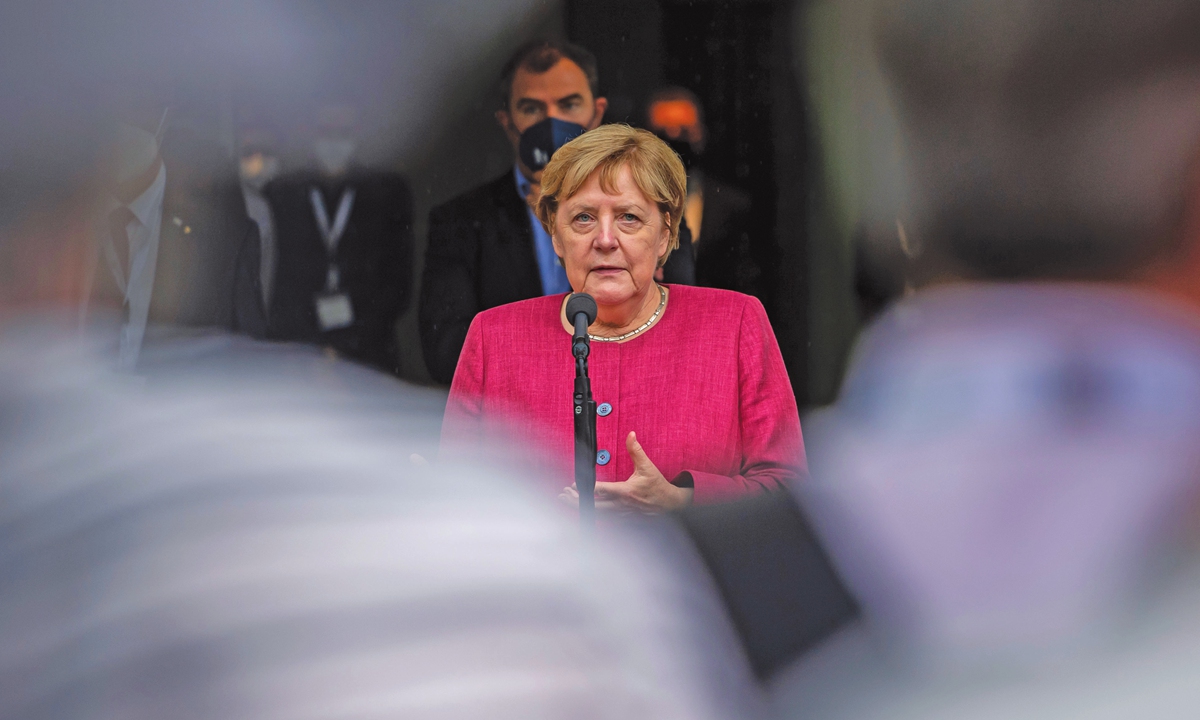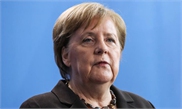
German Chancellor Angela Merkel Photo: VCG
In her 16 years in power, Chancellor Angela Merkel took a leading role not only in charting Germany's course but influencing the path taken by Europe too.Here are the stories of three people whose lives were upended by three of Merkel's most significant policy decisions:
Syrian in symbolic Merkel selfie
The encounter was quick - "maybe a few seconds" - during the febrile month of September 2015, in front of a temporary refugee shelter in Berlin.
Merkel, who only days before had made the watershed decision not to close Germany's borders to a wave of people fleeing war and oppression, was flanked by twitchy bodyguards.
Anas Modamani, a young Syrian who had just arrived in Germany, saw a limousine and decided it was his chance for a selfie with a woman he then believed to be a "famous actress."
A media photographer took a photo of Modamani getting the selfie - within hours, the snapshot of the 18-year-old refugee and the chancellor had become a symbol of Merkel's generous migration policy.
'Saved my life'
After taking part in protests in his hometown of Derayya, a suburb of Damascus, Modamani knew his days in Syria were numbered and began preparing for the long trek to Europe.
As Merkel embarks on retirement, the talkative young man does not hesitate to say that the German leader "saved my life."
As Modamani sees it, Merkel was the only European leader to worry about the fate of Syrians fleeing the war.
The nuclear lobbyist
German nuclear plant executive Ralf Gueldner was on a skiing holiday in the Swiss Alps when he read over breakfast that an earthquake had hit the Fukushima Daiichi nuclear power plant in Japan.
Less than a week after the disaster, Merkel would dramatically turn her back on nuclear energy and the industry to which Gueldner had dedicated his life's work.
Gueldner had been "fascinated" by atomic energy since his student studies, an interest that led to a job in the industry, working in nuclear safety.
He stuck with it, even when - after the Chernobyl disaster in 1986 - parents would approach him at the school gate to take up the subject with him.
Gueldner rose to be an executive at German energy company E.On's nuclear subsidiary and in 2010, the president of the German Nuclear Forum, in effect the sector's chief lobbyist and spokesman.
Powering down
The shock over Fukushima was quickly followed by a sense of "personal dismay" at the consequences for the industry.
Looking back, Gueldner described the period as a "sad moment." The contributions he and his colleagues had made, as he saw it, "to the protection of the climate and to our safety" were "wiped away at the stroke of a pen."
The difficult task of maintaining workers' motivation followed.
The last nuclear reactors will go offline at the end of 2022.
A board member at the nuclear energy company where he used to be an executive and vice president of the successor organization to the German Nuclear Forum, Gueldner is still making the argument for nuclear energy, despite officially retiring in 2016.
The Athens cleaner-turned-MEP
Once a cleaner struggling to fight for the rights of others like her, Constantina Kuneva may never have set her sights on a seat in the EU's parliament had she not been provoked into action by the painful austerity prescribed to Athens during the EU debt crisis.
In November 2009, Athens revealed a sharp rise in its public deficit that would unleash a financial crisis across the eurozone and leave Greece on its knees for a decade.
In exchange for bailout cash and to stop Greece from crashing out of the eurozone, the "troika," made up of the IMF, EU, and ECB, demanded across-the-board reforms from Greece - a tough stance that for many Greeks was personified by Merkel.
The stringent terms of the bailout sparked huge protests in Greece, with demonstrators venting their fury over the thousands of job losses and sweeping wage and pension cuts across the country.
Forced abroad for treatment
Kuneva herself was at that time recovering from a extremely horrific acid attack suffered just months before Greece slumped into its biggest post-war crisis.
An unknown assailant had poured acid on her face and down her throat in an attack believed to be linked to her union activities.
Kuneva said the poor conditions in Greece meant she could not get the treatment she needed in the country and had to travel to France.
Merkel "supported this policy" that hurt the common people, Kuneva said.
Still paying the price
As she recovered from her attack, Kuneva decided that she had to fight for Greece.
She joined the ticket of Greek radical leftist party Syriza on a list led by Alexis Tsipras, becoming one of 50 to win a seat at the Strasbourg parliament.
Kuneva does not only have harsh words for Merkel though, lauding her decision to keep Germany open to migrants in 2015.
But she said that Greece was still paying the price of the bailout policies.
Job losses, benefit cuts, and tax hikes were accompanied by the worst unemployment rate in memory, forcing the country's best and brightest to seek a better future abroad.
"Nothing grows [in Greece today]. What is left for us? " said Kuneva.
AFP


